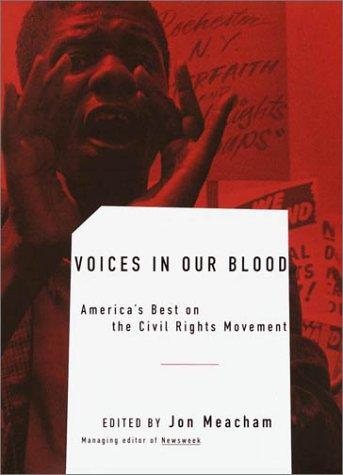In his 2001 work, Voices in Our Blood: America’s Best on the Civil Rights Movement, esteemed historian Jon Meacham crafts an anthology that transcends the typical historical account, weaving together the powerful words of key figures who shaped the Civil Rights Movement. This is not just a dry recounting of events; Meacham, known for his insightful biographies of American presidents, curates a chorus of voices that resonate with raw emotion and unwavering conviction. The book’s relevance remains striking today, as America continues to grapple with issues of race and equality, making it more than just a historical document—it’s a vital guide for understanding our present. Buy on Amazon.
Meacham masterfully organizes the book, allowing the reader to experience the movement through the writings of those who lived it. We encounter familiar names like Martin Luther King Jr., whose speeches and letters serve as cornerstones of the collection. The anthology also features lesser-known but equally powerful voices, including activists, journalists, and everyday people caught in the struggle. The book’s structure is designed to highlight the breadth and depth of the movement, moving from early struggles to landmark legislative victories. It’s not a chronological narrative in the strictest sense, but rather a carefully curated collection of thoughts, feelings, and experiences that, when brought together, offer a comprehensive understanding of the era.
The selected pieces are not just cold historical documents; they are imbued with a sense of urgency and personal sacrifice. For example, the powerful excerpts from Rosa Parks’s autobiography underscore her quiet courage and the deliberate nature of her actions. These are not just historical figures, they become living, breathing people with their own fears and dreams. The emotional weight of their words is palpable, making the history feel deeply personal and immediate. Reading the firsthand accounts of struggle and triumph brings the fight for civil rights out of the textbooks and into our hearts.
What truly sets this collection apart is the variety of perspectives included. Meacham does not shy away from showcasing the complexities within the movement, highlighting both moments of unity and points of disagreement. We hear from those who advocated for nonviolent resistance alongside those who called for more radical action. This nuanced portrayal avoids simplistic narratives, urging readers to consider the full spectrum of experiences within the movement. The book forces the reader to not only learn about the movement, but to feel it. Check it out on Amazon.
The writing styles vary as much as the voices themselves. Some pieces are eloquent and poetic, while others are raw and visceral. Martin Luther King Jr.’s writings, for instance, showcase his masterful use of rhetoric and powerful imagery. On the other hand, personal letters and diary entries offer an unfiltered look into the daily realities of life under segregation. The juxtaposition of these varied styles creates a dynamic reading experience, keeping the reader engaged and constantly challenged. The differences in writing styles are a reflection of the individuals and their experiences, adding another layer to the complexity of the book.
One passage that particularly resonated with me was a letter from a young black student detailing her experiences with segregation. The raw honesty and pain expressed in her words was a stark reminder of the very human cost of injustice. It’s one thing to read about historical events, but to connect with the personal toll they took on individuals is an entirely different experience. This deeply emotional passage connected me to this historical struggle on a more personal level, emphasizing the necessity for continued vigilance against racial inequality. This is where this book transcends the typical history book; it becomes a powerful reminder of the human experience.
Meacham’s selection demonstrates the vital role of writing in the Civil Rights Movement. The power of words, both written and spoken, was essential for inspiring hope, mobilizing action, and challenging injustice. The book provides evidence that words have the ability to incite change, to inspire compassion, and to document the human experience. The selections demonstrate the power of rhetoric as a tool for change, and it’s something that continues to hold relevance today. Purchase on Amazon.
Voices in Our Blood is more than just a collection of historical texts; it’s a profound exploration of the human condition in the face of injustice. It serves as a powerful reminder of the courage and resilience of those who fought for civil rights. It highlights the importance of empathy, compassion, and the pursuit of equality. The book is not just a recounting of history; it’s a call to action, reminding us that the fight for equality is far from over. It’s a challenging read, but also an incredibly inspiring one. Meacham’s thoughtful curation makes this book essential for anyone who wants to understand the legacy of the Civil Rights Movement and its ongoing relevance.
This anthology is highly recommended for anyone interested in American history, social justice, or the power of the human spirit. It would be particularly beneficial for students, educators, and activists seeking a deeper understanding of the Civil Rights Movement. Readers who enjoyed books like Parting the Waters by Taylor Branch or The Autobiography of Martin Luther King, Jr. will find Voices in Our Blood to be a valuable and enriching addition to their collection. It provides a unique perspective by allowing us to hear directly from the people who lived and shaped this pivotal moment in American history. Find it on Amazon.

